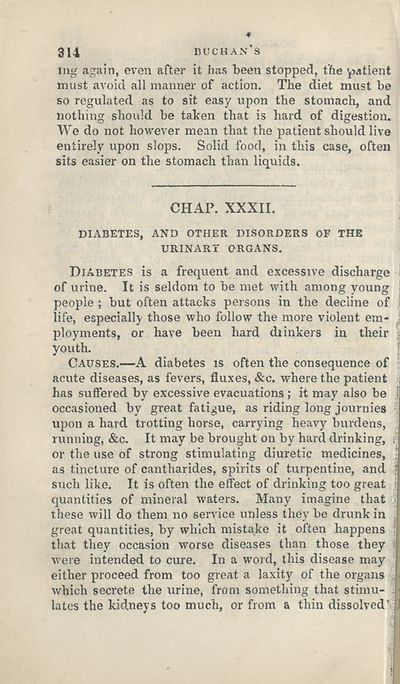Diseases > Domestic medicine
(348)
Download files
Complete book:
Individual page:
Thumbnail gallery: Grid view | List view

mg again, even after it has been stopped, the patient
must avoid all manner of action. The diet must be
so regulated as to sit easy upon the stomach, and
nothing should be taken that is hard of digestion.
We do not however mean that the patient should live
entirely upon slops. Solid food, in this case, often
sits easier on the stomach than liquids.
CHAP. XXXII.
DIABETES, AND OTHER DISORDERS OF THE
URINARi ORGANS.
Diabetes is a frequent and excessive discharge i
of urine. It is seldom to be met with among young !
people; but often attacks persons in the decline of !
life, especially those who follow the more violent em- j
ployments, or have been hard drinkers in their <
Causes.—A diabetes is often the consequence of
acute diseases, as fevers, fluxes, &c. where the patient
has suffered by excessive evacuations ; it may also be i
occasioned by great fatigue, as riding long journies
upon a hard trotting horse, carrying heavy burdens, j
running, &c. It may be brought on by hard drinking, i
or the use of strong stimulating diuretic medicines,
as tincture of cantharides, spirits of turpentine, and i
such like. It is often the effect of drinking too great >
quantities of mineral waters. Many imagine that
these will do them no sendee unless they be drunk in
great quantities, by which mistake it often happens .
that they occasion worse diseases than those they s
were intended to cure. In a word, this disease may
either proceed from too great a laxity of the organs ,
which secrete the urine, from something that stimu- ;
lates the kidneys too much, or from a thin dissolved'
must avoid all manner of action. The diet must be
so regulated as to sit easy upon the stomach, and
nothing should be taken that is hard of digestion.
We do not however mean that the patient should live
entirely upon slops. Solid food, in this case, often
sits easier on the stomach than liquids.
CHAP. XXXII.
DIABETES, AND OTHER DISORDERS OF THE
URINARi ORGANS.
Diabetes is a frequent and excessive discharge i
of urine. It is seldom to be met with among young !
people; but often attacks persons in the decline of !
life, especially those who follow the more violent em- j
ployments, or have been hard drinkers in their <
Causes.—A diabetes is often the consequence of
acute diseases, as fevers, fluxes, &c. where the patient
has suffered by excessive evacuations ; it may also be i
occasioned by great fatigue, as riding long journies
upon a hard trotting horse, carrying heavy burdens, j
running, &c. It may be brought on by hard drinking, i
or the use of strong stimulating diuretic medicines,
as tincture of cantharides, spirits of turpentine, and i
such like. It is often the effect of drinking too great >
quantities of mineral waters. Many imagine that
these will do them no sendee unless they be drunk in
great quantities, by which mistake it often happens .
that they occasion worse diseases than those they s
were intended to cure. In a word, this disease may
either proceed from too great a laxity of the organs ,
which secrete the urine, from something that stimu- ;
lates the kidneys too much, or from a thin dissolved'
Set display mode to:
![]() Universal Viewer |
Universal Viewer | ![]() Mirador |
Large image | Transcription
Mirador |
Large image | Transcription
| Antiquarian books of Scotland > Diseases > Domestic medicine > (348) |
|---|
| Permanent URL | https://digital.nls.uk/119892318 |
|---|
| Description | Thousands of printed books from the Antiquarian Books of Scotland collection which dates from 1641 to the 1980s. The collection consists of 14,800 books which were published in Scotland or have a Scottish connection, e.g. through the author, printer or owner. Subjects covered include sport, education, diseases, adventure, occupations, Jacobites, politics and religion. Among the 29 languages represented are English, Gaelic, Italian, French, Russian and Swedish. |
|---|

